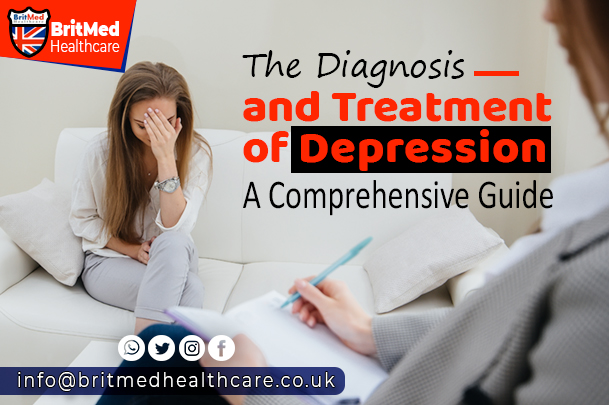The Diagnosis and Treatment of Depression: A Comprehensive Guide
Depression is a severe mental health disorder, affecting millions of people worldwide. It is one of those multifaceted mental disorders that can appear from light to very heavy and seriously impacts the quality of individual lives. The focus of the following paper is to provide an overview of how one can diagnose depression and its treatment, indicating what types of therapeutic methods are considered to be most effective, along with the latest developments in research.
Symptoms of Depression
Depression is defined as a sad mood state characterized by feelings of hopelessness and a lack of interest in activities that the patient once found pleasurable. Other common symptoms include:
– Changes in appetite and sleep pattern
– Fatigue and lethargy
– Irritability and anxiety
– Inability to concentrate and make decisions
– Suicidal thoughts or feelings
Diagnosing Depression
The diagnosis of depression generally involves a combination of clinical interviews, physical examinations, and psychological assessments. To diagnose depression, the following tools may be used by a mental health professional:
– DSM-5
– BDI
– PHQ-9
The diagnosis should be comprehensive, covering an individual’s past medical and psychiatric history, along with the current symptoms. Diagnosis for depression can be based on at least five symptoms of depression, which the sufferer has had for two or more weeks.
Treating Depression
Depression is normally treated with a mix of medication and psychotherapy. The most effective therapeutic approaches for treating depression include the following:
Cognitive-behavioural therapy: A talk therapy to identify and change negative thought patterns, for example. Interpersonal therapy: Improve your communication skills and interpersonal relationship. Medication: The various types of medications for treating depression include SSRIs including selective serotonin reuptake inhibitors and SNRIs, mainly antidepressants. MEDICATIONS FOR DEPRESSION
Antidepressant medications alleviate symptoms of depression by increasing levels of neurotransmitters in the brain, such as serotonin and norepinephrine, which are involved in mood, appetite, and sleep regulation.
The following are some commonly prescribed drugs for the treatment of depression:
Fluoxetine (Prozac)
Sertraline (Zoloft)
Paroxetine (Paxil)
Venlafaxine (Effexor)
Citalopram (Celexa)
Changes in Lifestyle
Along with medication and therapy, there are some changes in lifestyle that help manage depression. Some healthy lifestyle modifications include:
- Exercise: Research has shown that regular exercise can alleviate symptoms of depression.
- Diet: A diet balanced with fruits, vegetables, whole grains, and lean proteins can help decrease symptoms of depression.
- Sleep: Developing a regular sleep pattern will help elevate moods and decrease symptoms of depression.
- Social Support: Having a strong social support network can make all the difference for someone to not feel as alone or helpless.
Conclusion
Depression is an aggregation bag of a psychological illness, which cannot be treated per se; it needs an overall approach in treatment. Helping the individuals with their symptoms of depression, correct diagnosis of the disorder, and medication with therapy helps them get over their adjustment of symptoms and to some degree improvement in their lives. Exercise, dietary changes, sleep, and social support are also crucial for patients with depression.
References:
https://www.nimh.nih.gov/health/publications/depression
https://www.who.int/news-room/fact-sheets/detail/depression
https://www.mayoclinic.org/diseases-conditions/depression/symptoms-causes/syc-20356007
Websites:
Britmed Healthcare: https://britmedhealthcare.co.uk/
Nightingale Hospital: https://www.nightingalehospital.co.uk/
Top Doctors: https://www.topdoctors.co.uk/doctor/ahmed-el-missiry
You can also book, Contact us on WhatsApp 08009708017




